One of the more amazing aspects of the collectible automobile hobby is Porsche prices. Like those pesky Chinese spy balloons, the going rate for upper-end 356 and 911 Porsches is in the stratosphere. That leaves many folks who don’t have deep pockets scrambling to acquire lesser examples before they become unobtainable as well. Cars like the Porsche 912, 914, 924, 928, and 944 are already higher than their historical norms adjusted for inflation. So when a car like this 1969 Porsche 912 Targa for sale on eBay in Woodland, California hit the market, there is a mad scramble to jump on the bandwagon before it is too late. Already, there are 14 bids on this non-running high-mileage Porsche with a few rust issues and the high bid is currently $20,021. Does it make sense to purchase a car like this 912 and then sink a fortune into restoring it to its former four-cylinder glory? Do you think that this is a market that is going to eventually pop?
Perhaps the first question should be why would one want a Porsche in the first place? There are a plethora of reasons on the surface, such as styling, reputation, prestige, German engineering, camaraderie with other Porsche owners, snobbery, and much more. However, for those who love to drive, a Porsche delivers a certain experience that is not found in many other cars. They simply drive nicely at high speeds and, in the case of the rear-engine cars, there are a lot of folks who are adamant that the tail-out handling of the purest Porsches is exactly how a sports car should behave.
It is the early rear-engine 356 and 911 Porsches that people crave the most in today’s collectors market. In the fifties and sixties, Porsche forged their driver’s car reputation with these models. Back then people focused on handling and the ability of a car to be responsive to inputs and still be pleasurable after a long stint behind the wheel. Today we obsess more on 0-60 times, top speeds, and the time it takes for the latest sports car to lap the Nurburgring. It is good to see that people are showing interest in these early Porsches. The question is whether or not this interest is based upon the pleasure they bring to drivers or if it is how much they will financially appreciate.
Take for example this 1969 Porsche 912 Targa. The 912 was the four-cylinder version of the 911, and it was propelled with a mildly evolved version of the 356 powerplant. When Porsche came out with the 911 the price jumped considerably to take into account the substantial improvements that the more capable car delivered to buyers. Still, the 356 contingent was dissatisfied that Porsche had “left” them behind. Offering a less expensive and less feature-filled version of the new body was a way to bring these loyal customers back into the fold. The 912 was praised by magazines and enthusiasts as a balanced car, whatever that meant. As time wore on and the 356 experience that these customers relished became more of a memory, the 912 earned the reputation as the cheap Porsche in the pre-914 and 924 days. They weren’t particularly sought after unless you were looking for a body shell to make into a race car or you just wanted a Porsche and didn’t care how fast it went.
This example is typical of how you would find the average 912 before Porsche prices pulled away from reality. According to the seller, the clutch went out in 2009 and the car has sat ever since. It is also claimed to have been driven regularly and without issue before the entombment. Looking at the rust on the passenger side suggests that the car has spent its fifteen-year slumber partially exposed. However, we are assured that it was garaged during most of that time. The obvious surface rust is claimed to not be deep or through the metal on the exterior panels. There is rust damage in the battery tray, in the front where the trunk closes, and the floor pan is described as having “penetrating rust” due to “road damage.”
As for the rest of the car, the seller tells us that it was originally finished in Irish Green but was painted white by the second owner sometime in the eighties. It was around that time that the PORSCHE letters across the rear were removed and the mounting holes filled for refinishing. Unfortunately, the windshield has a crack in it and the left rear taillight is damaged. On a positive note, the targa top was redone shortly before the car was stored. It will also come with the optional factory original rear platform that replaced the toddler-sized rear seats and an extra set of floormats.
As for the flat-four Porsche powerplant, the seller states that the engine was rebuilt about 80-90,000 miles ago. The odometer reads 79,882, but it is believed to have turned over once. Nearly 200,000 miles is a lot of wear and tear for a car of this era, even if it is a Porsche. More alarming is the damage above. Can any Porsche experts comment on just what the shaft behind the damage is and its impact on the structural integrity of the car?
The picture above shows an interior with some tears in the seat and a few of the typical cracks in the dash for unrestored Porsches of the era. Considering the age and mileage, the interior is not as bad as it could be. For those many thousand miles, the previous owners did have a nice spot from which to enjoy the open road. The picture also gives us a good look at just how much of the big blue sky was visible to Targa owners. At the time, safety advocates were starting to show interest in convertibles and the Targa design was a good workaround to these concerns. This very useable partial convertible design is also an undeniable value enhancer for this car.
When you look at the condition of this vintage 912, it is clear that a full restoration would not be out of the question. The problem is that it costs just as much to restore a 912 as it does a 911. With the bidding just north of $20,000, is the juice worth the squeeze on this car? More than a few people think so. It will be interesting to see where this one tops out.
Do you think this 912 is worth the price plus the cost of restoration? Why or why not? Please put your thoughts in the comments.
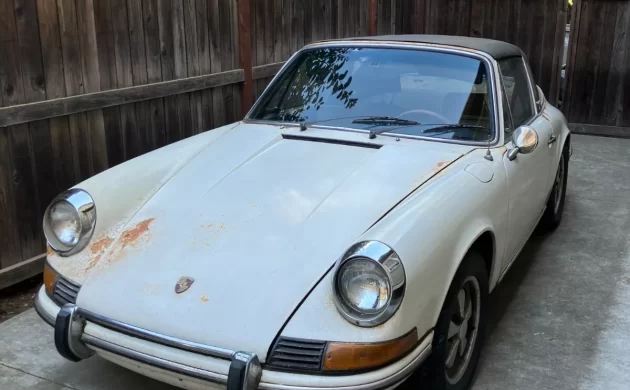
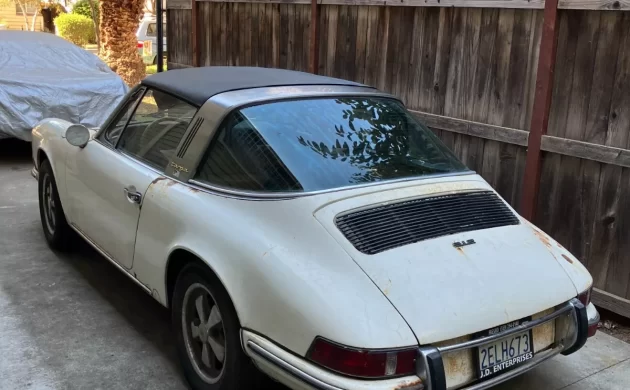
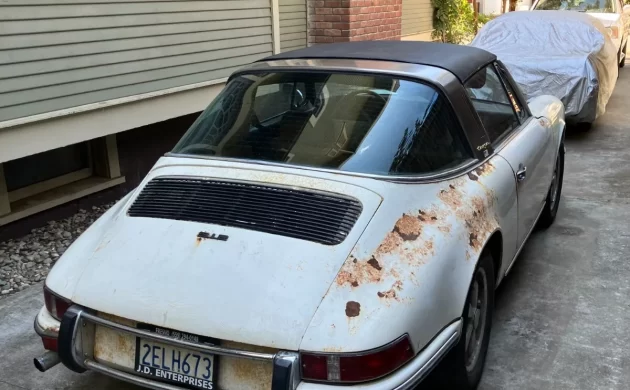
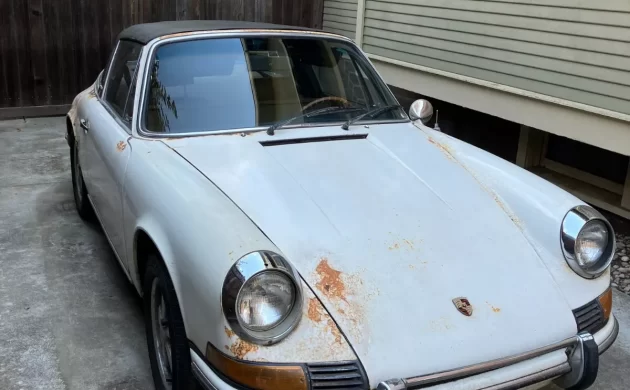
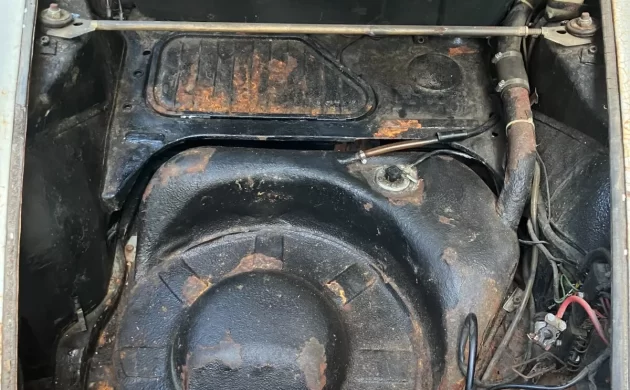
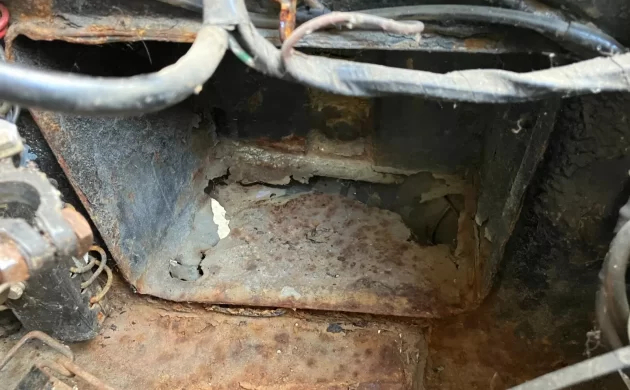
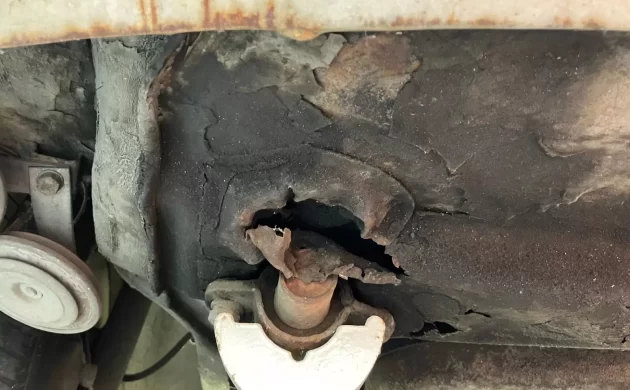
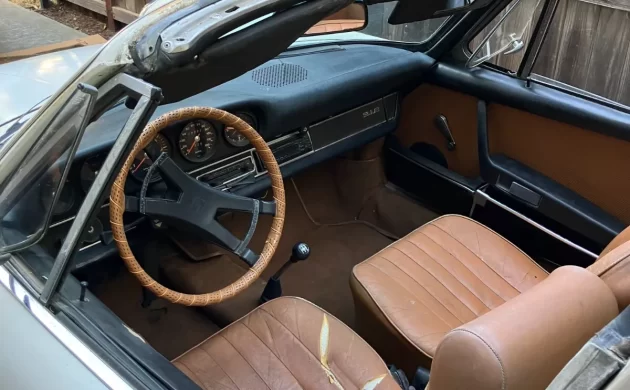
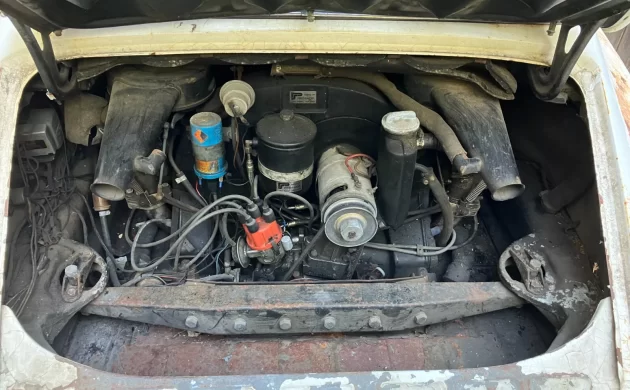





That rod looks like a stabilizer bar. Thats a tough call to revitalize that car or not. Thanks for all the info and education
That’s one of the two front torsion bars. Not sure how you get a hole like that in that location though.
I think buying a car with the idea of making a profit is not the brightest move anyone can make except maybe the rich and famous who don’t care what anything costs. Most of the cars we have bought and restored were not profit makers but the saving of the breed was the original goal. A ’69 912 Targa was my daily driver for a year and was just plain fun to drive. The “well balanced” comment refers to the car’s handling which is very good because of the lighter weight of the engine. You have to do suspension upgrades on the 911s to match the 912s. Present example is the Bugeye Sprite race car we are building whose chassis was pulled out of a long time stay in a back yard and will have just shy of $29,000 in it when finished. No profit there, just fun.
The guys that are spending 20 large on a car like this, don’t worry about money. Theirs is safely offshore, or they have sound investments. When will the bubble burst? Nov.6?
Or, perhaps, December 14th, or February 9th, or…?
Dec 14? Not on my wifes birthday. No way!
Bobhess – yes, I’d agree totally… almost impossible to make money buying a rough car and restoring it yourself to sell on. The costs of parts and services are so high, the math does not add up even when you can do most of the labor yourself (maybe you can find that elusive early-1960s Ferrari in the barn, pay some top-end professional restorer a Million dollars to restore it, and have a car worth 5 Million? but that’s obviously a total outlier).
The only reason to do-it-yourself is the fun and the experience of doing it. its a great hobby and rewarding in many non-financial ways. The most efficient way to own a nicely restored classic is to find one someone else has sunk a fortune in restoration costs – and buy that one !
…and not to be too cynical, but as to Jeff’s comment in the write-up…in the list of reasons why people particularly spend huge money to get a Porsche, I suspect “snobbery” comes higher up the list than most… not dismissing the driving experience as a factor, jus sayin”…
Tis pity they didn’t dip these bodies in zinc chromate. If they did, a lot more of these beauties would still be around.
They started doing that with the ’76 models.
I have recently restored a 67 912. I really enjoyed working on it, and think they are really classic in style and drive well. This particular 912 is a Targa, which you almost never see in a 912. Scarcity will definitely drive the price higher. Also, this just plain has a nice look to it. If you want to own a real classic, this would be a great one. Profit? Maybe, Maybe not? But just enjoy the ride!
I, too, like the 912. But this one is just too rusty. I think it would take $60K or more to restore it .
With the market noticeably softened in the last 6 months or so, the one marque that hasn’t seemed to decrease much in comparison to the others is Porsche. I guess they’re recession-proof.
The condition of the floor pan is better than expected, with a few small holes and one tear, which could probably be patched without having to replace the whole pan. The jack points look reasonable. The tube and torn metal are at the front mount of the front torsion bar, a common early 911/912 rust spot that makes the car undrivable. To fix it, the whole front crossmember must be replaced, but every Porsche body shop has done that hundreds of times, and parts are easily available.
The engine leaked a lot of oil before it was parked and will probably need a thorough overhaul. Unless a 912 transmission was abused, it would last well. Needs total paint, complete interior, plus electrical, etc., etc., etc. The whole job will cost at least $100,000, more for a show car.
One way to justify the cost of restoration is to keep the car and enjoy it for years. In 1988, I spent $22,000 to have my own 912 totally restored by a pro, more than it was worth at the time, but meanwhile I have driven a cool old Porsche for 36 years. What’s that worth to you?
It’s amazing what you can learn from the comments section. 😖
My late Brother in Law bought a ‘66 912/5 at the factory in July of ‘65. It was an awesome car! Factory specs stated that it had a combination cruising speed/top speed of 129 mph. When he and my sister returned from their honeymoon in July of ‘68, he proudly displayed a CHP traffic ticket showing that he was clocked at 129mph on I-5.
Do my old eyes deceive me or is that a generator? No alternator? In 1969?
That’s a generator. The fan is on the end of it inside the fan shroud.
A 912 Targa.
Could this be considered the red-headed stepchild’s stepchild?